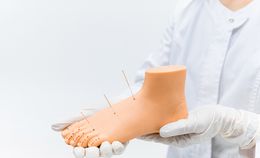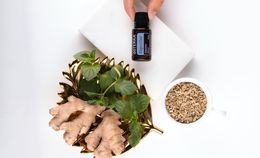What is Irritable Bowel Syndrome (IBS)?
Irritable bowel syndrome (IBS) is a term that describes a disorder of the digestive system. People with IBS regularly experience a number of symptoms including: stomach pain, diarrhea, and/or constipation. These symptoms can cause significant discomfort, and interfere with your quality of life.
IBS is extremely common. Studies suggest that over ten percent of the population could be diagnosed with IBS. Fortunately, while unpleasant, IBS is not dangerous - it is considered less severe than many other gut disorders.
However, your digestive system is essential to your overall wellness, and is intimately linked to the functioning of your mind and body. Your gut is also a place where you experience deep-rooted emotions and feelings - the area is sometimes called your core. Consequently, the fact that your gut is expressing the significant upset of IBS is an indication that something in your life is no longer working, and your core has been thrown out of balance.
IBS is likely caused by a combination of factors, including diet, emotional distress, and bacterial overgrowth. Treating IBS holistically involves addressing all these factors. Doctors often recommend working to clean up your gut by eliminating foods like gluten and dairy, eating a natural, healthy diet, and taking supplements. It is also essential to address any ongoing emotional suffering, whether a diagnosable psychological condition or painful life experiences, and otherwise lower your stress levels.
What are the symptoms of irritable bowel syndrome?
Common symptoms of irritable bowel syndrome include:
Stomach or gut pain
Gas
Bloating
Diarrhea
Constipation
Frequent changes in stool consistency
Low appetite or feeling full after eating only a little
Frequent urination
Low libido
Trouble sleeping
In addition, there is a strong link between IBS and mental and emotional health conditions like post traumatic stress disorder, depression, and anxiety. Many people with mental and emotional health conditions experience IBS. The stress of living with IBS can also make symptoms of those conditions worse.
What are the causes of irritable bowel syndrome?
Irritable bowel syndrome has long been described as what is called a functional disorder. This means that people with IBS experience consistent symptoms, but no clear physical cause for those symptoms has been identified. However, research increasingly links IBS to a number of factors, including intestinal bacterial overgrowth and other disruptions of the microbiome, food allergies and psychological pain and stress.
One major study published in Nature Reviews Gastroenterology & Hepatology argued that IBS is best seen as a systemic disorder. In other words, there is no single cause, but several components coming together to create symptoms.
Physical
People who have been diagnosed with IBS may be experiencing symptoms in part because of a bacterial overgrowth in their small intestine. Also known as SIBO, small intestinal bacterial overgrowth, occurs when the small intestine, which normally contains very low levels of bacteria, is colonized by bacteria from further down the digestive tract. SIBO is a common condition that results in symptoms including those seen in people with IBS, and studies have shown that people with IBS are more likely to have SIBO.
Evidence also suggests that other disruptions in your microbiome, or the collection of bacteria that live in your gut, can also contribute to IBS. This can include an imbalance of healthy and unhealthy gut bacteria, or conditions like leaky gut syndrome. Gut infections, such as parasites, can also significantly impact your digestive system, and should be examined as a possible cause.
Food allergies are also thought to play a role. Gluten - a protein found in wheat, rye and barley - can irritate the digestive system. This is especially true for people who have celiac disease, or are otherwise particularly sensitive to gluten. Oats contain a protein similar to gluten that can also cause problems for some people. Likewise, dairy is often a digestive irritant. Less common food allergies can also be contributing to your symptoms.
The link between the brain and the gut likely plays a significant role in IBS. Your body's stress response can significantly affect your gut health, particularly if you are experiencing chronic, ongoing stress. Conversely, an unhealthy gut and microbiome can also contribute significantly to feelings of psychological and emotional stress. Researchers have also found slight changes in brain structure in people with IBS, including evidence that those diagnosed with the disorder have an overstimulated stress response.
Although IBS is not an autoimmune or inflammatory disorder, it may also have an immune reaction component, as some degree of immune dysfunction is often a factor in health conditions related to the brain-gut connection.
Genetic
IBS has been found to have a heritable component. This means if a close relative has IBS, you are more likely to develop IBS yourself. Some specific genes have been suggested as being risk-factors for IBS; however, in many cases the evidence is currently inconclusive.
Emotional
Mental and emotional health is thought to play a major role in the development of IBS. One study published in the World Journal of Gastroenterology described IBS as "a combination of irritable bowel and irritable brain". The same study noted that the vast majority of people with IBS are dealing with some form of mental and emotional suffering - whether a diagnosable condition like depression or anxiety, early childhood trauma, painful life events, chronic stress, or any combination thereof. Anything from physical, emotional or sexual abuse to conflict in a close relationship to a stressful work environment can be factors that lead to IBS.
Other studies have noted that a serious, painful emotional experience often occurs shortly before a person first experiences IBS symptoms.
In short, for most people, IBS has emotional roots. This doesn't make your symptoms any less real, and it also doesn't mean there aren't significant physical health issues that need to be addressed as well. However, it does mean that psychological and emotional healing, as well as stress reduction, is a critical part of treating IBS.
Environmental
There is little research directly exploring a connection between exposure to toxins and IBS. However, exposure to many toxins is known to have a significant impact on your overall gut health. Taking steps to avoid pesticides, harsh household cleaners and other harmful chemicals is always a good idea.
How do you heal irritable bowel syndrome?
Treating and healing irritable bowel syndrome is usually a matter of addressing several different factors. Treatments can include changing your diet, working with a therapist to heal emotionally, lowering your stress.
Assessment
There is no test to determine whether or not you have IBS. Doctors diagnose IBS by taking note of your symptoms over a period of time. Typically, if you have been consistently experiencing symptoms of IBS for 3 months, you can be diagnosed with the disorder.
An integrative, naturopathic or functional medicine physician can assess and diagnose you, and work with you to come up with a plan for treatment. They can also test you for food allergies or intestinal parasites, which may be contributing to your symptoms.
Lifestyle
Taking steps to lower your stress and feel more relaxed can help. Exercise can be a powerful stress reducer, and releases feel-good endorphins that boost your mood. Mind-body practices like yoga and meditation are also highly effective (over time) at helping you feel more at ease. Getting enough sleep is always important.
In addition, emotional support plays a big role in making you feel better. Everyone needs loving, supportive relationships - whether with a partner, family or friends - in order to be okay. Making a point of spending time with people you enjoy and care about can really help, as can choosing to limit the time you spend in high-stress situations or with people who create stress.
In other words, take it easy on yourself.
Nutrition
Getting the right nutrition is an important part of treating IBS. A holistic physician can help provide specific guidance for what foods to eat and supplements to take. Common suggestions include:
Diet
It is generally a good idea to avoid certain foods known to commonly irritate the digestive system. For many people, this includes dairy and gluten specifically, as well as spicy foods, soy, corn and yeast. Caffeine and alcohol can also cause problems. As a general rule, junk food, processed foods and sugar are all harmful to your gut health. It's a good idea to eliminate these foods for a month or two, and see if you feel better.
Eating foods that are natural, easy on your digestive tract and promote gut health can also help. These include healthy fats like coconut oil, olive oil, ghee or avocado, cooked vegetables, probiotic-rich foods like kefir (which is okay despite containing dairy), healthy proteins, and homemade broth. If your gut feels better after eating a particular food or meal, take note of that.
As a rule, foods you make from scratch are usually healthier than anything that comes in a box or a can.
Supplements
Taking a high-quality probiotic can really help your digestive health. In addition, ginger soothes the stomach and helps promote good digestion, while omega-3s reduce inflammation and promote brain health. Taking a digestive enzyme is also often recommended, along with soluble fibers like psyllium.
Healing modalities: who should I go see?
Holistic physicians are typically a great choice to help you work with a gut disorder of any kind. This includes doctors who practice naturopathic, integrative or functional medicine, as well as other doctors who specialize in using natural approaches to healing the gut.
Traditional Chinese medicine (TCM) doctors are also often effective at working with IBS. TCM typically uses a combination of treatment approaches, including acupuncture, herbal medicine and qi gong. These can help address both the physical and emotional causes of IBS.
Seeing a therapist is also a good idea. Psychotherapy or counseling can be a way to address the emotional roots of IBS. A therapist can help you explore and heal emotional pain, as well as learn how to manage and lower your stress.
References:
5 Simple Steps to Cure IBS without Drugs
Dr Mark Hyman
Selected Studies
Small Intestinal Bacterial Overgrowth and Irritable Bowel Syndrome: A Bridge between Functional Organic Dichotomy
Uday C. Ghoshal, Ratnakar Shukla, and Ujjala Ghoshal
Gut & Liver, 2017
The relationship between irritable bowel syndrome and psychiatric disorders: from molecular changes to clinical manifestations
Mihaela Fadgyas-Stanculete, Ana-Maria Buga, Aurel Popa-Wagner, and Dan L Dumitrascu
Journal of Molecular Psychiatry, 2014
Impact of psychological stress on irritable bowel syndrome
Hong-Yan Qin, Chung-Wah Cheng, Xu-Dong Tang, and Zhao-Xiang Bian
World Journal of Gastroenterology, 2014
Towards a System View of IBS
Emeran A. Mayer, Jennifer S. Labus, Kirsten Tillisch, Steven W. Cole, & Pierre Baldi
Nature Reviews Gastroenterology & Hepatology, 2016
Treatment of irritable bowel syndrome in China: A review
Chun-Yan Li and Shu-Chuen Li
World Journal of Gastroenterology, 2015





















